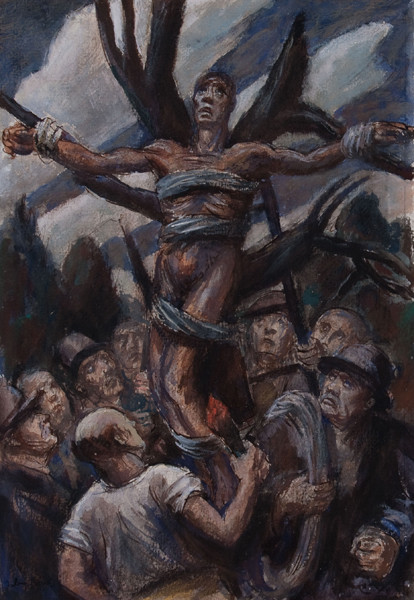Spiritual Sunday
As we celebrate Martin Luther King, Jr.’s birthday (yesterday his birthday, tomorrow the day we celebrate it), it’s worth reflecting on how oppressed groups have found sustaining narratives in Christ’s message, even as purported Christians have used those same texts to keep them down. (Check out how Harriet Beecher Stowe describes this happening.) With this in mind, I turn to Langston Hughes’s “Christ in Alabama,” written during the Scottsboro affair.
The “Scottsboro boys,” as they were called, were nine African-American teenagers, from 12-19, who were accused to raping two white women in 1931. Although they were innocent of the charges (there was medical evidence that no rape had been committed and one of the accusers later recanted), they would be dragged through the courts for years and barely escaped being executed. It was during this time that Hughes wrote his poem:
CHRIST IN ALABAMA
Christ is a Nigger,
Beaten and black –
O, bare your back.
Mary is His Mother –
Mammy of the South.
Silence your mouth.
God’s His Father –
White Master above,
Grant us your love.
Most holy bastard
Of the bleeding mouth:
Nigger Christ
On the cross of the South.
Hughes later recounts the reception the poem received in his essay “My Adventures as a Social Poet.” He wrote the poem after visiting the men in prison, after which some students published it:
Contempo, a publication of some of the students at the University of North Carolina, published the poem on its front page on the very day that I was being presented in a program of my poems at the University in Chapel Hill. That evening there were police outside the building in which I spoke, and in the air the rising tension of race that is peculiar to the South. It had been rumored that some of the local citizenry were saying that I should be run out of town, and that one of the sheriffs agreed, saying: “Sure, he ought to be run out! It’s bad enough to call Christ a bastard. But when he calls him a nigger, he’s gone too far!”
Hughes reports a mixed reaction from the university:
The next morning a third of my fee was missing when I was handed my check. One of the departments of the university jointly sponsoring my program had refused to come through with its portion of the money. Nevertheless, I remember with pleasure the courtesy and kindness of many of the students and faculty at Chapel Hill and their lack of agreement with the anti-Negro elements of the town. There I began to learn at the University of North Carolina how hard is to be a white liberal in the South.
Of course, African Americans growing up in the Jim Crow south had far more in common with Christ than white sheriffs. In his imagery, Hughes bestows a kind of sainthood on those crucified by lynch mobs. “Most holy bastard of the bleeding mouth” could well be a riff off of Christ’s bleeding heart—bleeding for fallen humanity—while Mary has become the “mammy of the south” who mourns her son.
“God the Father” comes off less well in the poem, standing in for the white slave masters who raped their slaves, producing mixed race (and profitable) bastards. If God is an old man in a white beard, Hughes wants nothing to do with him.
Jesus and Mary, however, he can relate to. And once one fully acknowledges that Jesus is God incarnate, then the human narrative about God starts changing as well.


